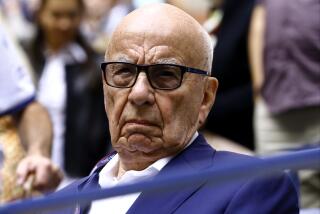Changing Channels in China
- Share via
HONG KONG — TV reporter Rose Luqiu didn’t think twice about charging into Baghdad when the missiles started flying in March. But when anti-government protests erupted in the streets of Hong Kong in July, Luqiu and her colleagues weighed the matter carefully before finally deciding to air a short story.
As the star correspondent for Phoenix Satellite Television, a Hong Kong-based network, Luqiu takes care not to offend the Chinese government. Doing so would jeopardize Phoenix’s status as the only foreign-owned television channel with permission to broadcast news to the mainland in Mandarin, the dominant language there.
“Baghdad is international news, it’s not so sensitive,” Luqiu said. “But political stories, anything having to do with the mainland, are more difficult. To tell the truth without getting into trouble, it takes a lot of skill.”
Yet the fact that the protest was aired at all represents the revolution of sorts that has been taking place in Chinese television with the growing popularity of Phoenix and the launch of its 24-hour news channel two years ago.
The government network, China Central Television, or CCTV, is largely a propaganda machine, filling its newscasts with official announcements and sleep-inducing coverage of party meetings. Phoenix showcases live reports from the field and plays up the personalities of its stylish news anchors. Topics never covered by the mainland news media -- such as Taiwanese electoral politics -- are dissected on newscasts and in provocative talk shows.
Phoenix also offers movies and entertainment on two other channels, everything from dubbed versions of the American unscripted program “Survivor” to Taiwanese dating shows.
By all accounts, the channel is a huge hit -- for those who can get it. Satellite dishes are illegal in most of China, except in authorized areas including foreign housing compounds and hotels. But illegal dishes abound (sometimes concealed near rooftops, sometimes not), and the channel is also obtained illegally via cable. Having access to Phoenix is a status symbol for China’s growing middle class.
“When they purchase new homes, they want to know, “Do you have Phoenix TV?” said Victor Yuan, an opinion pollster based in Beijing. “When they book hotels, they want to know, ‘Do you have Phoenix TV?’ When they get together with friends, they ask each other, ‘Do you watch Phoenix TV?’
“If you do, you feel very lucky,” he said.
College students and elites are also regular viewers.
“Almost anyone with a TV in the dorm has the channel fixed on Phoenix,” said Ran Meng- ming, a student at the Beijing Broadcasting Institute. “They provide more information. CCTV doesn’t have the same freedom. If CCTV is the only thing you watch, you may miss something big.”
Beyond becoming a status symbol, Phoenix has forced stodgy old CCTV and thousands of other regional channels to update their programming, media observers say. Some Chinese announcers have recently begun to doll up for the cameras, and are less robotic in reading the news. In May, CCTV launched its own 24-hour news channel -- some say in direct response to the challenge from Phoenix.
“Phoenix is not perfect, but it’s a shock to the system,” said Steven Dong, assistant dean at Qinghua University’s School of Journalism and Communication in Beijing. “It shows how backward Chinese TV is.”
The channel is also affecting the culture in other ways. Yuan’s group recently conducted research into the lives of Chinese prostitutes, many of whom ply their trade in hotels. The women said they get little sex education from the official media but learned a lot from a former Phoenix program called “Sex and Love Classroom,” which featured tips on protected sex.
Phoenix, which is co-owned by media mogul Rupert Murdoch and has a staff of several hundred, operates out of a crowded floor in a Hong Kong high-rise. Advertisers include banks, drug companies and electronics makers. The station estimates that it can reach 42 million people, or about 12%, of the TV households in mainland China.
Beijing periodically cracks down on illegal satellite dishes, but mostly it looks the other way. One reason is that Phoenix (along with other foreign channels) is seen as a window on the West for elites and government officials who can afford satellite dishes and are considered sophisticated enough to avoid coming under the spell of outside media.
Still, there is always the threat of government enforcement. Phoenix, with its Mandarin broadcasts, has to be especially careful not to provoke action, media observers say.
“Phoenix is allowed to exist because it never infringes on the ideological principles of the Chinese Communist Party,” said Chip Tsao, a freelance editorial writer in Hong Kong.
The Phoenix phenomenon is the result of a partnership between Murdoch’s News Corp. and Liu Changle, a former soldier in the People’s Liberation Army who went on to become a radio reporter and wealthy businessman.
Murdoch provided the capital and satellite infrastructure needed for the station’s launch in 1996, one year before Hong Kong returned to Chinese rule. Liu provided political connections and local expertise, according to media analysts.
Shares in Phoenix were offered publicly on the Hong Kong stock exchange in 2000, but Murdoch’s Star TV Group (a News Corp. subsidiary) and Liu each retained a 38% stake. Phoenix has been losing money for the last two years, which station managers have attributed to the costs of starting the 24-hour news channel. They predict the satellite network will break even by year’s end and turn a profit next year.
For Murdoch, Phoenix was a way to expand his global media empire to the largest market of all, China. But he offended Chinese authorities in 1993 when he claimed that advances in telecommunications threatened totalitarian regimes.
That remark prevented Murdoch from entering the Chinese market on his own, analysts say, forcing him to team up with Chinese partners through Phoenix. Since then, Murdoch appears to have bent over backward to please the Chinese government -- yanking the BBC off his Star TV and vetoing plans by his book division to publish the memoirs of Chris Patten, the last British governor of Hong Kong.
Those actions appear to have paid off. Early last year, the Chinese granted him the right to beam Star TV’s Starry Sky channel to the mainland, with programming that includes Chinese versions of Western favorites such as “Judge Judy” and “The Tonight Show.”
Around the same time, Beijing allowed Phoenix and AOL Time Warner’s China Entertainment Television, or CETV, to deliver Mandarin-language entertainment programming to ordinary Chinese homes via cable. So far, however, these telecast rights are restricted to southern China’s Guangdong province, a manufacturing mecca near Hong Kong.
Compared with the mammoth state-owned CCTV, Phoenix is practically a mom-and-pop operation, with only three recording studios, a tiny library and elbow-to-elbow desks that give the station a low-budget, start-up feel.
“In terms of hardware and size, we can’t even compare to a provincial station in China,” reporter Luqiu said.
But what the station lacks in personnel, it makes up in pizazz.
Take Sally Wu, a celebrity news anchor recruited from Taiwan. With her stylish wardrobe and silky voice, there could not be a greater contrast between Wu and the traditional Chinese news announcer, who in the past was typically never identified by name.
“The mainland audience has never seen such an attractive, fashionable presenter before,” said Cao Jingxing, the deputy head of Phoenix’s news channel. “She even had highlights in her hair. People couldn’t help remember her.”
Wu’s 20-minute news update was introduced as a trial balloon in 1997. A few months after she went on the air, Wu was picked out of a crowd to ask questions by Zhu Rongji during his first news conference as China’s premier in the spring of 1998. It made her an instant star.
“I was so busy taking notes I didn’t even hear it when he called my name and said something like ‘Take care of this young lady, I like her program,’ ” Wu recalled from the Phoenix studio in Hong Kong.
The station made the most of her sudden fame. Her 20-minute slot grew to several hours of news programs spanning all hours of the day, and Wu got her own weekly special. Other news- related features, financial reports and various commentaries were rolled out, and in 2001 Phoenix added the 24-hour news channel.
“The market pushed us in this direction. It shows China needs news programs that are different from CCTV,” said Cao, who also serves as a regular commentator on a late-night news analysis program.
Competitors seem to be taking note. One of Phoenix’s most popular shows, a Taiwanese dating game, has spawned hundreds of clones among China’s regional stations. Tell-all celebrity interview shows are now rampant. Even “Survivor” has inspired Chinese renditions.
“Market competition is such that every time we create a new show format, someone on the mainland will come up with a copycat program,” Cao said. “But news, that’s where we have a decided lead.”
On Sept. 11, 2001, CCTV waited hours before getting approval to show video of the terrorist attacks in the U.S. But Phoenix went live within minutes. For days it stopped all regular programming in favor of 9/11 coverage, much as the U.S. television networks did. Many say Phoenix made its reputation with the terrorist attacks, in the same way CNN got on the map with its coverage of the 1991 Persian Gulf War.
By the time the Iraq war started this year, CCTV was ready with its own round-the-clock coverage with live feeds. It became a dry run for its own 24-hour news channel, which it launched this May. Critics say it might never have done that if not for the heat from Phoenix.
But the satellite channel outdid the government Goliath. In a highly publicized stunt, Phoenix’s Luqiu drove into Baghdad, becoming the only Chinese reporter to file from the Iraqi capital after the U.S. launched its bombing campaign. CCTV’s male reporter had retreated to safety and had to scurry back to defuse a flurry of bad publicity.
“Phoenix changed how the Chinese media looks at things,” said Lan Xue, a media analyst in Hong Kong. “It showed them how news can and should be done. It pushed them to improve.”
More to Read
Sign up for Essential California
The most important California stories and recommendations in your inbox every morning.
You may occasionally receive promotional content from the Los Angeles Times.













